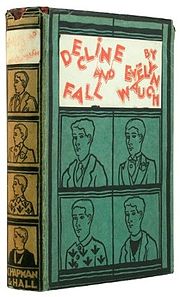- Decline and Fall
-
Decline and Fall 
1st editionAuthor(s) Evelyn Waugh Illustrator Evelyn Waugh Country United Kingdom Language English Genre(s) Satire Publisher Chapman and Hall Publication date 1928 ISBN NA Followed by Vile Bodies Decline and Fall is a novel by the English author Evelyn Waugh, first published in 1928. It was Waugh's first published novel; an earlier attempt, entitled The Temple at Thatch, was destroyed by Waugh while still in manuscript form. Decline and Fall is based in part on Waugh's undergraduate years at Hertford College, Oxford, and his experience as a teacher in Wales. It is a social satire that employs the author's characteristic black humour in lampooning various features of British society in the 1920s.
The novel's title is a contraction of Edward Gibbon's The History of the Decline and Fall of the Roman Empire. The title alludes also to the German philosopher Oswald Spengler's The Decline of the West (1918–1922), which first appeared in an English translation in 1926 and which argued, among other things, that the rise of nations and cultures is inevitably followed by their eclipse. Waugh read both Gibbon and Spengler while writing his first novel.[1] Waugh's satire is unambiguously hostile to much that was in vogue in the late 1920s, and "themes of cultural confusion, moral disorientation and social bedlam...both drive the novel forward and fuel its humour."[2] This "undertow of moral seriousness provides a crucial tension within [Waugh's novels], but it does not dominate them." [3] Waugh himself stated boldly in his 'Authors Note' to the first edition: 'Please bear in mind throughout that IT IS MEANT TO BE FUNNY.'
In the text of the 1962 Uniform Edition of the novel Waugh restored a number of words and phrases which he had been asked to suppress for the first edition.
Contents
Plot summary
The novel tells the story of Paul Pennyfeather, student at the fictional Scone College, Oxford, who is sent down for running through the college grounds without his trousers, having become, inadvertently, immersed in the activities of the Bollinger Club. Having defaulted on the conditions of his inheritance, he is forced to take a job teaching at an obscure public school in Wales called Llanabba, run by Dr Fagan. Attracted to the wealthy mother of one of his pupils, Pennyfeather becomes private tutor to her boy, Peter, and then engaged to be married to her - the Honourable Mrs Margot Beste-Chetwynde (who later becomes "Lady Metroland," and appears in Waugh's other novels.)[4] Pennyfeather, however, is unaware that the source of her income is a number of high-class brothels in South America. Arrested on the morning of the wedding, after running an errand for Margot related to her business, Pennyfeather takes the fall to protect his fiancée's honour and is sentenced to seven years in prison for traffic in prostitution. Margot marries another man with government ties and he arranges for Paul to fake his own death and escape. In the end he returns to where he started at Scone. He studies under his own name, having convinced the college that he is the distant cousin of the Paul Pennyfeather who was sent down previously. The novel ends as it started, with Paul sitting in his room listening to the distant shouts of the Bollinger Club.
The novel was dramatized as the 1969 film, Decline and Fall... of a Birdwatcher starring Robin Phillips and also for BBC Radio 4 in 2008 by Jeremy Front and starred Alistair McGowan as Pennyfeather, Jim Broadbent as Grimes, Andrew Sachs as Prendergast, Edward Hardwicke as Dr. Fagan, Jonathan Kidd as Philbrick, Joanna David as Margot Beste-Chetwynde, Emma Fielding as Flossie and Richard Pearce as Peter.
Critical reception
The Guardian praised the book as 'a great lark; its author has an agreeable sense of comedy and characterisation, and the gift of writing smart and telling conversation, while his drawings are quite in tune with the spirit of the tale'. The newspaper also compared the superficial presentation in the novel to that employed by P. G. Wodehouse.[5] Arnold Bennett hailed it as 'an uncompromising and brilliantly malicious satire'[6] and the writer John Mortimer called it Waugh's 'most perfect novel...a ruthlessly comic plot.'
References
- ^ David Bradshaw, Introduction p.xviii Penguin 2001, Decline and Fall ISBN 978-0-14-118090-8
- ^ David Bradshaw xxv/xxvi introduction 2001 Penguin edition
- ^ Ian Littlewood, The Writings of Evelyn Waugh Oxford, Basil Blackwell, 1983
- ^ Vile Bodies: A Revolution In Film Art, Evelyn Waugh Newsletter, Winter 1974
- ^ Decline and Fall by Evelyn Waugh (classics) The Guardian. 12 October 1928
- ^ Quoted in Martin Stannard(editor), Evelyn Waugh, the Critical Heritage, RKP 1984
See also
Bibliography of Evelyn Waugh Novels Decline and Fall (1928) • Vile Bodies (1930) • Black Mischief (1932) • A Handful of Dust (1934) • Scoop (1938) • Put Out More Flags (1942) • Brideshead Revisited (1945) • Scott-King's Modern Europe (1947) • The Loved One (1948) • Helena (1950) • Love Among the Ruins. A Romance of the Near Future (1953) • Sword of Honour: Men at Arms (1952) • Sword of Honour: Officers and Gentlemen (1955) • Sword of Honour: Unconditional Surrender (1961) • The Ordeal of Gilbert Pinfold (1957)Short stories Mr Loveday's Little Outing: And Other Sad Stories (1936) • Work Suspended: And Other Stories (1943) • Selected Works (1977) • Charles Ryder's Schooldays: And Other Stories (1982) • The Complete Short Stories (1997) • The Complete Stories of Evelyn Waugh (1998)Travel writing Labels (1930) • Remote People (1931) • Ninety-Two Days (1934) • Waugh In Abyssinia (1936) • Robbery Under Law (1939) • When the Going Was Good (1946) • A Tourist In Africa (1960)Biographies Rossetti: His Life and Works (1928) • Saint Edmund Campion: Priest and Martyr (1935) • The Life of the Right Reverend Ronald Knox (1959)Other books See also Categories:- 1928 novels
- Comedy novels
- Novels by Evelyn Waugh
- Debut novels
- University of Oxford in fiction
Wikimedia Foundation. 2010.
